|
 
IN
THE NEWS | CALENDAR
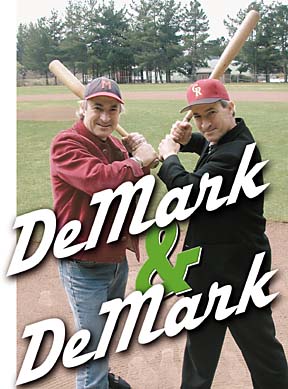
[Twins Jeff and Paul DeMark]
by ARNO HOLSCHUH
![[Jeff sitting at his desk]](cover0328-jeffatdesk.jpg) "OK, OK. This is the No. 1 reason I wanted
to do this article. Are you listening?" Jeff DeMark asks,
then clears his throat into the tape recorder. "OK, OK. This is the No. 1 reason I wanted
to do this article. Are you listening?" Jeff DeMark asks,
then clears his throat into the tape recorder.
"A lot of people here know
we are twins, but a lot don't. And I wanted to set the record
straight. Because a lot of people think we're schizophrenic."
It's understandable. Jeff and
Paul DeMark are twins; they live in the same city; both have
artistic pursuits that put them in the public eye. They play
on the same softball team and share a passion for baseball and
music.
And their physical resemblance?
To the untrained eye they look -- well, identical.
But their lives are very distinct.
These two prominent Arcata artists may look alike, but they travelled
markedly different paths to get where they are today. And they
have found different modes of expression: Paul works in public
relations for the College of Redwoods by day and plays drums
in the Delta Nationals, an American roots music band, by night.
Jeff is a writer and performer with four one-man shows under
his belt. The latest, Hard as Diamonds, Soft as Dirt,
premieres April 13 at CR.
![[Paul sitting at his desk]](cover0328-paulatdesk.jpg) But it isn't unusual for one to be mistaken for
the other. The result? People think there is something rotten
in the state of DeMark. But it isn't unusual for one to be mistaken for
the other. The result? People think there is something rotten
in the state of DeMark.
"There was this woman I
knew casually, enough to say hi," Jeff said, preparing to
unwind another of the stories that he has made his literary trademark.
"All of the sudden, she started ducking away from me every
time I saw her. She wouldn't say hello. Then one day she walks
up to me and says, `I'm sorry I've been acting that way, but
the first time I saw you you were so friendly, and then I'd see
you again and you'd act like you didn't know me. You did it over
and over again. I started to think you were sick.'"
What she didn't realize was
she had been seeing two people but knew only one of them.
"I've been to Jeff's shows
where I walk around at intermission and people tell me what a
great first half I'm having," Paul said.
"It's the same thing when
he's drumming," Jeff chimes in. "I'll walk into the
club and people will go, `What the hell are you doing out here?
You were just on stage!'"
We'll all have to put up with
the confusion, because the DeMark brothers are here to stay.
We should feel lucky.
A traditional
start
![[Dad and baby twins]](cover0328-dadnboys.jpg) Paul and Jeff DeMark were born May 29, 1951, in
Racine, Wis. It was a regular little industrial town, Jeff said. Paul and Jeff DeMark were born May 29, 1951, in
Racine, Wis. It was a regular little industrial town, Jeff said.
"It was a very low-key
working class town. They had all these factories -- Massey Ferguson,
Johnson's Wax had their international headquarters there, Walker
Manufacturing."
Jeff and Paul's father [with one-year-old twins in photo at
right] was a dentist and their
mother a homemaker. It was all very traditional, Paul said. "I
would describe it as a typical Midwest working-class home."
They spent their childhood in
the most traditional of pursuits -- sports, especially baseball.
Jeff said he can remember playing stickball in the sandlot with
his twin and the other kids in his neighborhood every day during
the summers.
The two were inseparable. They
played on the same teams, were in the same class at school, even
slept in the same bed. They were so close that sibling rivalry
was out of the question.
"We were of very equal
abilities," Paul said. "I think we have always had
an unspoken agreement not to compete against each other in a
negative way."
And they did not need to compete.
By the time they were in high school, they were already following
different paths. Jeff was obsessed with basketball; Paul broke
his ankle when he was a sophomore and became more introverted.
![[twins with their little brother]](cover0328-3brothers.jpg) Neither
one took part in the social unrest of the late '60s. There wasn't
any counterculture in Racine for them to participate in, Jeff
said. Neither
one took part in the social unrest of the late '60s. There wasn't
any counterculture in Racine for them to participate in, Jeff
said.
"Racine is between Milwaukee
and Chicago, so you'd think it was this real cosmopolitan place,"
Jeff said. "But it was its own little independent world."
Vietnam wasn't a topic of discussion
in Racine during their high school years -- even when one of
their peers came home dead.
"Ken Hawkinson. I remember
he used to buy us beer with a fake ID. And then they were having
his funeral at this little wooden church called the Sacred Heart,
and honestly I hardly had any idea what had happened," Jeff
said.
That was all about to change,
however. In 1969 the twins graduated from high school and went
to Madison for college.
[Photo above left:
the twins with their brother Dan]
![[twins at age 5]](cover0328-boysinhats.jpg) Berkeley
of the Midwest Berkeley
of the Midwest
The DeMarks stepped out of the
island of Racine and right into a cultural and political revolution.
Madison was one of the most active college campuses in the country
during that season of protest. The Vietnam War was everywhere.
"Our lives changed completely,"
Paul said. "Right away I started going to workshops about
the Vietnam War. It was everywhere."
What Paul learned quickly made
him into another one of the thousands of students at the University
of Wisconsin opposed to the war. "I just didn't believe
in it," he said. "I educated myself enough to know
that I didn't think we should be in Vietnam."
Paul started going to demonstrations
-- lots of them. He rode on a bus to Washington and marched on
the Capitol; he was teargassed in downtown Madison.
"[Protesting] was a big
part of my life, an integral part of my life."
Being in Madison was just as
much of a change for Jeff as it was for Paul. But for Jeff, 1969
was as much about culture as politics.
"I was diving into this
entire new world of ideas. New music, new film, different people,
even people from other countries," he said.
Visits home were punctuated
by heated arguments over the war.
"Our parents were certainly
against us being involved in the protests," Paul said. The
DeMarks lived between two different cultures: In Madison, everyone
was anti-war, but in Racine people couldn't even tolerate the
protesters' haircuts -- much less their arguments.
And the DeMarks had turned away
from much of what Racine meant. Who had the time to care about
baseball? There was a war on.
"We changed so quickly,
I understand why they were upset," Jeff said.
Leaving Madison
The funny thing is that once
your life starts changing, it doesn't stop until it's good and
ready. The twins were not destined to stay in Madison. Both of
their college careers were derailed and would not be completed
until the early 1980s.
Paul was on his way to a demonstration
late in his freshman year when he had an existential crisis.
"We knew the National Guard was there and we would probably
be teargassed and all that. I just thought to myself, `I've spent
a whole year doing this, risking my life. And what do I really
want to do? I want to play the drums.'"
He stopped at a music store
on the way to the demonstration and put $20 down on a very cheap
gold-sparkle three-piece drum set. He picked the set up on the
way back from the demonstration, started playing and never looked
back.
"I found a drum teacher
and started practicing as much as I could," he said. "When
I found the drums, I knew this was the form of expression I needed.
It was right for me, absolutely perfect."
![[Sunnyland Slim and Paul]](cover0328-slimpaul.jpg)
Left: Sunnyland Slim and
Paul at the Telluride Jazz Festival, 1979.
Within a year he had dropped
out of school and was playing with Chicago blues legend Sunnyland
Slim. His playing would eventually take him to San Francisco,
then Rio Dell to play with a country band called the Sons of
Redwood Country. More drumming gigs pulled him north to Arcata
in 1975. He settled into a good groove, with enough jobs playing
drums to keep himself busy.
For Jeff, the derailment came
at about the same time, but in a radically different form. He
had an adverse reaction to a psychedelic drug during the second
semester of his freshman year and had to drop out. He went back
to Racine to recover, and the fall of his sophomore year found
him living at home, taking classes at community college and working
in a factory making prosthetics.
He lasted almost a year, then
hitchhiked to New Orleans on a whim. After contracting hepatitis
at a $3 hotel, he hitched back to Racine by way of Nashville.
Once home, he found another factory job and started to save money
for his next trip.
So begins the next chapter in
Jeff's life: first the factory, then the highway. It was a pattern
he would follow throughout the '70s. He went to New York and
met both Allen Ginsburg and Bob Dylan; he slept on beaches in
Acapulco; he lived in Guatemala for five months cooking over
a wood fire and reading Dostoyevsky in a hammock. He also worked
at Young Radiator, Insinkerator and the Wisconsin Cheese factory.
"I'd spend time sitting
in this hammock reading with five Indian kids looking in at me,
and then suddenly I'd be back in my hometown Racine, the Land
of the Gray."
![[Jeff in Guatemala]](cover0328-guatemalajeff.jpg)
Jeff in Guatemala on Lake
Atitlan, 1975.
Starting in 1974, he was also
writing poetry and holding the occasional reading. Like Paul,
Jeff had found his artistic medium.
His first trip to Humboldt County
came in 1977. After working at a garbage disposal factory for
a year, he lit out for California to see his twin.
"I spent a good year out
here living in Arcata," he said, studying yoga, taking a
poetry class. But then he had to move on again -- this time to
Sante Fe, working as a printer's assistant, waiter and movie
extra.
"Butch Cassidy and the
Sundance Kid: The Early Days. I did three days there as a
cowboy. That was a trip."
Then one day, while digging
a ditch in the desert Jeff remembered what his mother had always
told him: If he didn't finish college, he'd end up digging ditches
for a living.
"I just said to myself,
`Screw this, I'm getting out of here and going back to college.'"
He set his sights on Madison.
![[Jeff driving a taxicab]](cover0328-taxijeff.jpg) 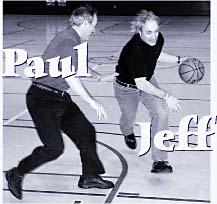
Left: Jeff driving his
taxi in Madison, 1981. Right: Paul and Jeff in a brotherly basketball
challenge.
Separate paths
converge
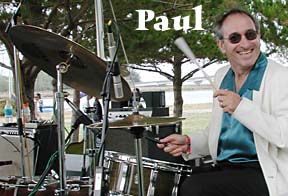 In the '80s, the DeMarks started to hit on the
steady beats that would sustain them throughout their lives.
Paul returned to school and graduated with a degree in journalism
from Humboldt State. He worked as a reporter for the Redwood
Record in Garberville, moved to the Arcata Union and
became managing editor in 1988 while he continued his drumming
part time. Along the way he married and had two children. In the '80s, the DeMarks started to hit on the
steady beats that would sustain them throughout their lives.
Paul returned to school and graduated with a degree in journalism
from Humboldt State. He worked as a reporter for the Redwood
Record in Garberville, moved to the Arcata Union and
became managing editor in 1988 while he continued his drumming
part time. Along the way he married and had two children.
Jeff spent most of the '80s
in Wisconsin, finishing school while selling ads for a radio
station, driving a taxi and tending bar. In 1986 he hit the road
again, this time for San Francisco where his artistic identity
took another step forward.
"I had heard about this
place where you could do [poetry] readings. And I went down and
saw -- they were actors. And I saw I've gotta do it by memory.
So I got a director and started."
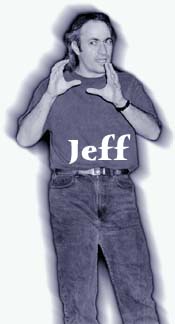 He turned his poetry into stories and memorized
his lines. In 1987 the one-man literary experience known as Jeff
DeMark took the stage for the first time. In 1990 Jeff moved
to Arcata and after more than 15 years, the DeMarks brothers
were together, again. He turned his poetry into stories and memorized
his lines. In 1987 the one-man literary experience known as Jeff
DeMark took the stage for the first time. In 1990 Jeff moved
to Arcata and after more than 15 years, the DeMarks brothers
were together, again.
Paul left reporting for a temporary
public relations job at HSU in the early '90s and in 1998 was
hired by College of the Redwoods for a permanent slot.
"I really enjoy promoting
education," he said. "That's especially true for community
college education, because so often an education here means a
success story for someone," he said. "I feel that I've
truly arrived at my job."
Although Jeff returned to school
one more time -- for a teaching credential -- his real success
came outside the classroom. He wrote and started performing three
popular shows based on his own experiences: Writing My Way
Out of Adolescence (1993), Went to Lunch, Never Returned
(1994) and Making Every Mistake Twice (1998). Jeff
also married and became a father. Life was looking up.
Taking stock
Life changed for the DeMarks
in February 1999 when their father died of brain cancer.
Paul said, "It gave me
an opportunity to reflect on what I was doing in my life. I'd
been performing in bands consistently for about 27 years; I decided
that if I was going to put together another band, I wanted to
play the music that meant the most to me." He went back
to his Sunnyland Slim roots and decided that his heart lay with
what he calls "classic American music" -- rockabilly,
classic country, swing, early pop music, R&B and soul. Within
months, he put together a band of like-minded musicians, and
within a year the Delta Nationals were born.
The Nationals are bassist and
singer Ross Rowley, guitarist Steve Irwin and keyboardist Dave
Ryan. All have day jobs, incredible talents on their instruments
and a serious desire for roots music. They started with rockabilly
-- Elvis' "Mystery Train" and some Carl Perkins. Then
they developed another set, this time New Orleans R&B, followed
by jump swing music and later early American pop singles.
![[Paul with bandmates]](cover0328-paulband.jpg)
Left: Jeff driving his
taxi in Madison, 1981. Right: Steve Irwin, Paul DeMark, Dave
Ryan and Ross Rowley of Delta Nationals.
"Now we're developing a
set of country music. And we've started to move into '60s soul.
We played `Walking the Dog' just the other night."
But who wants to hear all that
old stuff? A lot of people. The Nationals are already finding
themselves turning down gigs. It came as a surprise to Paul,
because this band wasn't created with popularity in mind.
"I had gotten to a place
where I was thinking too much about what the audience thought.
Did they like the band? Were they impressed with my playing?
But after my dad died, I was saying to myself, `Why am I doing
this?'
"I wanted to do a project
that meant something to me."
Jeff also took stock of his
life in the wake of their father's death.
"I was thinking about the
legacy a parent leaves," he said. "It isn't the material
things, money or anything like that. It's about what qualities
or passions they pass on to you." Jeff said his father left
him with a code of honor, loyalty, a love of all sports, particularly
baseball ("He had a tryout with the St. Louis Cardinals")
--the ability to tell stories.
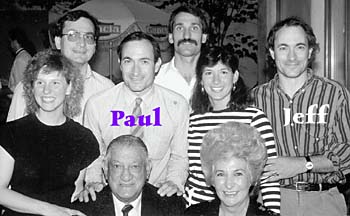 A family reunion
of DeMark siblings and their parents, circa 1990. Standing left
to right: Maria, Mike, Paul, Dan, Anne and Jeff. Seated are parents
Frank and Gerri. A family reunion
of DeMark siblings and their parents, circa 1990. Standing left
to right: Maria, Mike, Paul, Dan, Anne and Jeff. Seated are parents
Frank and Gerri.
"My dad was just a natural storyteller. He
didn't try to be, he just was."
So it was natural for Jeff --
who literally believes he has storytelling in his blood -- to
write about the legacies of his father. His new show, Hard
as Diamonds, Soft as Dirt, is a collection of stories about
his father, baseball, life and death.
Like all Jeff's shows, this
one is pinned together more by a general idea than a plot. And
fans of the DeMark humor will find easy gratification in anecdotes
about Jeff's days in a Beatle wig or how to drive a junior varsity
baseball coach crazy. But this show, more than his others, has
a center of real weight. Like the best drama, it asks questions
about what our lives mean and how we should face mortality.
Today at 50, the twins have
come full circle. They are the father figures, in positions of
responsibility, building careers and rearing children -- and
passing on their own passions for storytelling, music, baseball
and life.
But to see them together, it
is easy to imagine them at 16 -- the jokes, the funny faces and
voices, the stories that no one in the world could understand
but a twin.
"I've met identical twins
that didn't like each other," Paul said. "They have
severe problems. They're in a lot of pain because they've rejected
a part of themselves."
"Luckily, we just like
each other," Jeff said.
A DeMark Field Guide
IT'S A TERRIFYING SITUATION: You round
the corner in your favorite night club, theater, coffeeshop,
grocery store or street and there he is: A DeMark.
But which one? Sure, you could take the
easy way out, phrasing your greeting so as to avoid actually
using a first name. But these guys have been on the receiving
end of salutations like "Hey there, guy!" or
"How's it going, man?" all their lives. You're
not fooling the DeMark boys.
So here are a few easy-to-remember clues
for identifying a DeMark in the wild:
- The Apparel.
Paul, who works in public relations at the College of the Redwoods,
is likely to be dressed in business casual, whereas Jeff is likely
to be dressed in just plain casual. He also wears a turquoise
ring.
- The Hoops. If
you're being beaten on a basketball court, the likelihood is
that it is by Jeff -- he was obsessed with basketball in high
school, whereas Paul broke his ankle and had to quit the team.
- The Rhythm.
If at any point in your DeMark encounter the subject in question
starts drumming out a syncopated rhythm on his leg, it's Paul.
The accomplished musician has compulsively tapped out beats on
dashboards, desks, or whatever else was handy since high school.
- The Shoes.
Starting in high school, the DeMarks wore different styles of
shoes so that their peers could tell them apart. Jeff wears loafers,
but Paul wears regular laced shoes.
|
IN
THE NEWS | CALENDAR
Comments? E-mail the Journal: ncjour@northcoast.com

© Copyright 2002, North Coast Journal,
Inc.
|


![[Jeff sitting at his desk]](cover0328-jeffatdesk.jpg) "OK, OK. This is the No. 1 reason I wanted
to do this article. Are you listening?" Jeff DeMark asks,
then clears his throat into the tape recorder.
"OK, OK. This is the No. 1 reason I wanted
to do this article. Are you listening?" Jeff DeMark asks,
then clears his throat into the tape recorder.![[Paul sitting at his desk]](cover0328-paulatdesk.jpg) But it isn't unusual for one to be mistaken for
the other. The result? People think there is something rotten
in the state of DeMark.
But it isn't unusual for one to be mistaken for
the other. The result? People think there is something rotten
in the state of DeMark.![[Dad and baby twins]](cover0328-dadnboys.jpg) Paul and Jeff DeMark were born May 29, 1951, in
Racine, Wis. It was a regular little industrial town, Jeff said.
Paul and Jeff DeMark were born May 29, 1951, in
Racine, Wis. It was a regular little industrial town, Jeff said.![[twins with their little brother]](cover0328-3brothers.jpg) Neither
one took part in the social unrest of the late '60s. There wasn't
any counterculture in Racine for them to participate in, Jeff
said.
Neither
one took part in the social unrest of the late '60s. There wasn't
any counterculture in Racine for them to participate in, Jeff
said.![[twins at age 5]](cover0328-boysinhats.jpg) Berkeley
of the Midwest
Berkeley
of the Midwest![[Sunnyland Slim and Paul]](cover0328-slimpaul.jpg)
![[Jeff in Guatemala]](cover0328-guatemalajeff.jpg)
![[Jeff driving a taxicab]](cover0328-taxijeff.jpg)

 In the '80s, the DeMarks started to hit on the
steady beats that would sustain them throughout their lives.
Paul returned to school and graduated with a degree in journalism
from Humboldt State. He worked as a reporter for the Redwood
Record in Garberville, moved to the Arcata Union and
became managing editor in 1988 while he continued his drumming
part time. Along the way he married and had two children.
In the '80s, the DeMarks started to hit on the
steady beats that would sustain them throughout their lives.
Paul returned to school and graduated with a degree in journalism
from Humboldt State. He worked as a reporter for the Redwood
Record in Garberville, moved to the Arcata Union and
became managing editor in 1988 while he continued his drumming
part time. Along the way he married and had two children. He turned his poetry into stories and memorized
his lines. In 1987 the one-man literary experience known as Jeff
DeMark took the stage for the first time. In 1990 Jeff moved
to Arcata and after more than 15 years, the DeMarks brothers
were together, again.
He turned his poetry into stories and memorized
his lines. In 1987 the one-man literary experience known as Jeff
DeMark took the stage for the first time. In 1990 Jeff moved
to Arcata and after more than 15 years, the DeMarks brothers
were together, again.![[Paul with bandmates]](cover0328-paulband.jpg)
 A family reunion
of DeMark siblings and their parents, circa 1990. Standing left
to right: Maria, Mike, Paul, Dan, Anne and Jeff. Seated are parents
Frank and Gerri.
A family reunion
of DeMark siblings and their parents, circa 1990. Standing left
to right: Maria, Mike, Paul, Dan, Anne and Jeff. Seated are parents
Frank and Gerri.